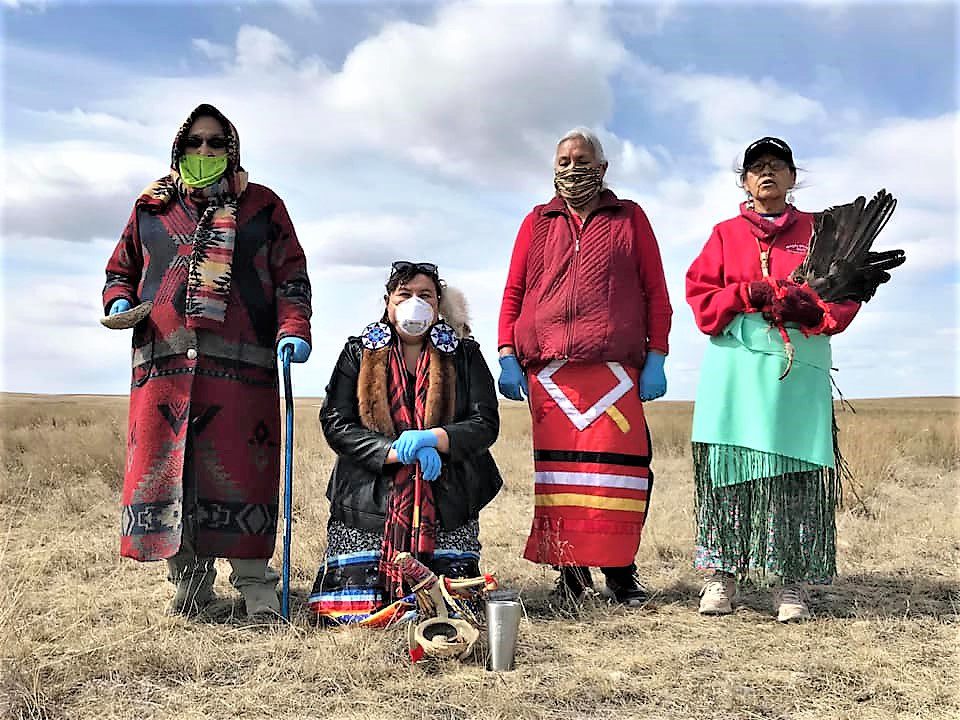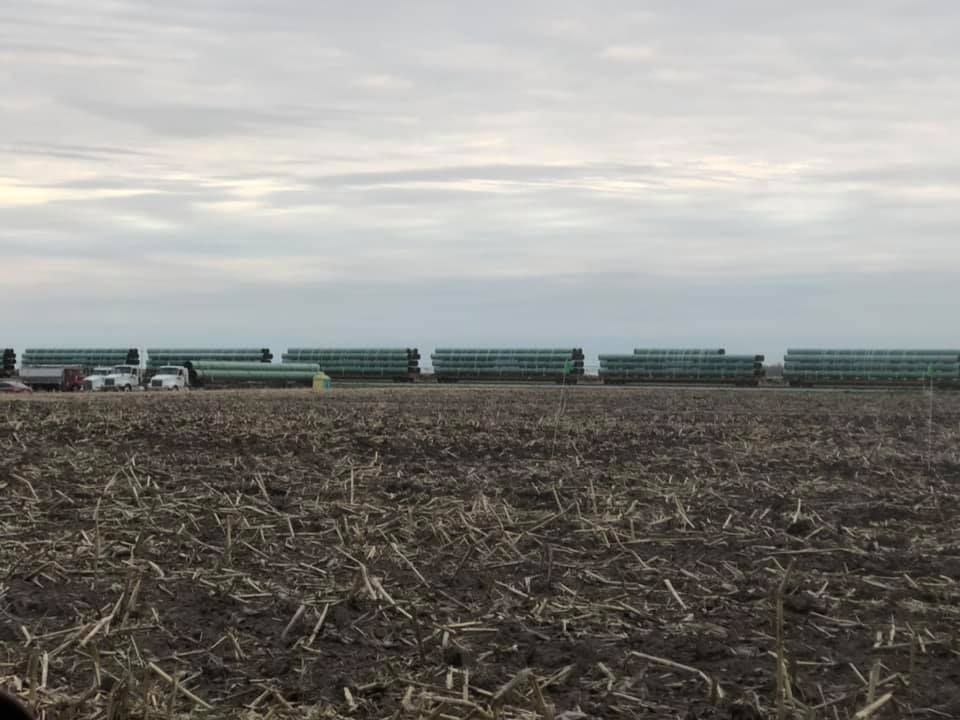
Ten U.S. states and the federal District of Columbia joined tribal government opposition to the KXL oil pipeline construction on May 7, calling for a moratorium on all permits for fossil-fuel infrastructure projects during the Covid-19 pandemic.
The request follows an outcry in Indian country over ongoing Keystone XL Pipeline construction despite the most recent federal court decision to revoke the private company’s water crossing permit, as well as those of all other similar projects. Even after the court revoked permissions, the Canadian builder of the private hazardous materials infrastructure was still proceeding with work in May all along the route across Montana, South Dakota and Nebraska.
“For years, our tribes’ concerns that the Army Corps’ Nationwide Permit process was arbitrarily contrived with no clear path for consultations or legality have been ignored,” said Faith Spotted Eagle, founder of the Yankton Sioux Brave Heart Society, on the day of the court decision. “Today, thankfully, we were heard as the water crossings spoke loud and clear against the Keystone XL Pipeline.”
But it wasn’t long before it became clear that the pipeline company had no intention of heeding the court order. Pipeline watchdogs began documenting trainloads of pipe shipments, as well as truckers and contractors working at construction sites, stockpiling apparently weathered and corroded pipe sections, in South Dakota and Nebraska.
Native pipeline fighters from all three impacted states have created an online “Cancel KXL” petition at https://nokxlpromise.org/covid-19/ and are asking all supporters to sign and disseminate widely. They also produced a poster dissing the pipeline and sent it to their governors.

Calling on the Federal Energy Regulatory Commission, FERC, for “an immediate moratorium on approvals,” were the Attorneys General of Maryland, Massachusetts, Connecticut, Delaware, Illinois, Minnesota, New Mexico, Oregon, Rhode Island, Virginia, and the District of Columbia.
“To preserve the due process rights of parties during this unprecedented time, and to ensure that the communities that will ultimately be burdened by any approvals are sufficiently heard, the State Attorneys General respectfully request that the Commission impose an immediate moratorium on all new approvals of fossil-fuel infrastructure projects,” they said.
When Montana U.S. District Judge Brian Morris revoked the federal Army Corps of Engineers’ Nationwide Permit 12 for TC Energy Corp.’s proposed route across hundreds of Missouri River Basin waterways on April 15, it had created a moment of celebration for tribal opponents of the 1,200-mile toxic tar-sands crude-oil conduit.
Judith LeBlanc, director of the Native Organizer Alliance, pronounced the permit revocation “a victory for treaty rights and democracy.”
The judge banned any and all “dredge or fill activities” until the Corps of Engineers conducts and completes a public consultation process, as per the Endangered Species Act.
LeBlanc noted that enforcement of the Endangered Species Act provides tribal nations “a renewed opportunity to exercise our legal and inherent rights to protect the water of the Missouri River bioregion for all who live, farm and work on the land.”
The non-profit Indigenous Environmental Network gathered reactions from Indian Country on the case filed by the statewide grassroots Northern Plains Resource Council, headquartered in Billings, Mont.
Dallas Goldtooth, Keep it in the Ground coordinator for the Indigenous Environmental Network, responded: “We wish to recognize the tremendous work by our allies! This decision vindicates what we have always known. We can only hope that our organization’s ongoing litigation will receive a comparable decision as well. In the meantime, we fight on in defense of the sacredness of Mother Earth!”
The network and tribes have an ongoing case against the pipeline project in the same district court, arguing treaty rights violations.

The morning of the court decision, grassroots pipeline resisters held a water prayer ceremony in Sweetgrass, Mont., where the pipeline is being built across the Canada-U.S. border under a separate permit.
Their group, Kokipasni — No Fear, describes its adherents as “frontline organizers from the Fort Peck Assiniboine Sioux tribal nation protecting our land, water, and sky.”
Women and youth of Kokipasni, led by Angeline Cheek, took part in an Assiniboine Medicine Lodge Pipe ceremony, “praying for our people, the 24,000 clean water drinkers of Northeast Montana, the land, the sky, the sacred sites and even for the KXL workers coming in from the four corners of the United States not protected against the Covid-19,” said celebrant Lance Fourstar.
“I prayed that this pipeline be stopped, the hearts and minds of all sides be touched by the creator and given guidance, strength, endurance and protection. I prayed for our Medicine Lodge, that we are protected against this pandemic,” he explained.
Blackfeet and Northern Cheyenne tribal members joined the Assiniboine from Ft. Peck Indian Reservation, which is entirely bounded on its southern side by the Missouri River.
“I was one of the kids who had to drink contaminated water from the oil boom in the 60’s said Ft. Peck elder Cheyenne Foote. “We finally have clean water and now we see history is ready to repeat itself. I do not want my grandkids to experience the same illness I did from drinking poisonous water.”
Ft. Peck is one of the many tribal nations of Oceti Sakowin that has spoken out against TC Energy’s Keystone XL Pipeline for more than a decade, Kokipasni observed. “Our voices have been ignored as the pipeline is pushed on our territories. We will stand firm against the KXL; we need you to stand with us.”
Participants described being “surrounded by helicopters, private security, border patrol and drones.” They wore masks, in line with public health protocol for slowing the spread of the Covid-19 viral epidemic, which they warned is an ever-greater threat with the advent of pipeline construction worker man-camps.
Fourstar complained that pipeline security guards are not practicing physical distancing, another part of the protocol. Corporate guidelines for the pandemic promise that Keystone XL operations require “Covid-19 training will be provided to all employees upon arrival to site, and physical distancing requirements will be maintained.”
TC Energy Corp. announced a $20,000 Covid-19 crisis relief donation on April 24, to Montana’s Valley County, which overlaps the Ft. Peck Reservation and is 9 percent Native American.
The corporation (formerly TransCanada Corp.) said it would distribute the charity in the form of dry goods during the third week of May. It will consist of totes filled with household cleaners and hygiene products, such as toothpaste, dish and laundry soap and shampoo. Families in need will be able to drive up and receive the products, it said.
TC Energy Corp. gathered responses to the recent court ruling from its temporary construction labor pool, announcing a joint statement April 17 by the North America’s Building Trades Unions, the American Petroleum Institute and the Interstate Natural Gas Association of America.
They agreed, “Based on our initial review, one thing is clear: The judge’s decision to vacate NWP12 went well beyond what the plaintiffs requested. The decision creates tremendous uncertainty in an already uncertain time and could lead to lengthy delays.”
TC Energy’s first quarter 2020 report to investors at their May 1 meeting, maintained that the project is still expected to be functioning in 2023. “We are reviewing options to address the impact of this ruling and to secure the necessary authorizations to continue with planned Keystone XL construction,” it said.
Contact Talli Nauman at talli.nauman(at)gmail.com

- Clemency for Lakota icon Leonard Peltier called ‘moral indictment’ - January 21, 2025
- Lakota tribes, grassroots close ranks to defend Black Hills watersheds - January 21, 2024
- Native ‘hempsters’ follow global cooperative example - August 30, 2023
Assiniboine Sioux Brave Heart Society Cheyenne Foote Dallas Goldtooth Faith Spotted Eagle Fort Peck Indigenous Environmental Network Judith LeBlanc Keystone XL Pipeline Kokipasni -- No Fear Native Organizer Alliance Yankton Sioux
Well done, keep up the good work.
Native Americans owned North America Columbus didn’t discover if people were already here… Native Americans were given land land where ancestors lay buried. Now on their lands it is being raped for pipelines that will do harm to waterways used for drinking. Battles are being fought in courtrooms where people have won their rights. Still pipelines are being transported in workers digging up burial grounds is anything sacred even a glass of water clear will turn black from oil spilled. Money means nothing when the water is gone and can’t be drank.
Still pipelines are being transported in workers digging up burial grounds is anything sacred even a glass of water clear will turn black from oil spilled. Money means nothing when the water is gone and can’t be drank.
Peace and love. Stay safe and be strong. Where can I donate?
Thanks so much for asking, Amity! I will write to you personally so we can talk about the different options.
Thanks so much for asking, Amity! We will write to you personally so we can talk about the different options.
don’t let them destroy your land. they think they can take everything they want. money doesn’t save your people or your land. i am so sick the corrupt buzzards taking what they think is theirs but no money doesn’t replace lives. i will pray for you and your people